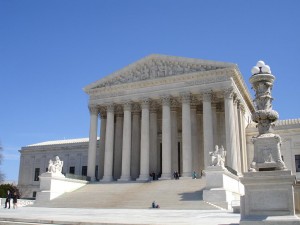Commentary

Cicely Wilson
The Supreme Court issued six opinions today. Read more about the decisions below.
Fisher v. Univ. of Texas at Austin
Docket: 11-345
Date: June 24, 2013
Read commentary & review related lower court decisions here.
 Justia Summary: Since the Court’s 2003 decision, Grutter v. Bollinger, the University of Texas at Austin has considered race as a factor in undergraduate admissions. A Caucasian, rejected for admission, sued, alleging that consideration of race in admissions violated the Equal Protection Clause. The district court granted summary judgment to the University. The Fifth Circuit affirmed. The Supreme Court vacated and remanded, reasoning that the Fifth Circuit did not hold the University to the demanding burden of strict scrutiny articulated in Supreme Court precedent. A university must clearly demonstrate that its purpose or interest is constitutionally permissible and substantial, and that its use of the classification is necessary to the accomplishment of its purpose, and “that the reasons for any [racial] classification [are] clearly identified and unquestionably legitimate.” A court may give some deference to a university’s judgment that diversity is essential to its educational mission, if diversity is not defined as mere racial balancing and there is a reasoned, principled explanation for the academic decision. The University must prove that the means it chose to attain diversity are narrowly tailored to its goal and that admissions processes “ensure that each applicant is evaluated as an individual and not in a way that makes an applicant’s race or ethnicity the defining feature of his or her application.” A reviewing court must ultimately be satisfied that no workable race-neutral alternative would produce the educational benefits of diversity. The Fifth Circuit simply presumed that the school acted in good faith and gave the plaintiff the burden of rebutting that presumption. Strict scrutiny does not permit a court to accept a school’s assertion that its admissions process uses race in a permissible way without closely examining how the process works in practice. On remand, the Fifth Circuit must assess whether the University has offered sufficient evidence to prove that its admissions program is narrowly tailored to obtain the educational benefits of diversity.
Justia Summary: Since the Court’s 2003 decision, Grutter v. Bollinger, the University of Texas at Austin has considered race as a factor in undergraduate admissions. A Caucasian, rejected for admission, sued, alleging that consideration of race in admissions violated the Equal Protection Clause. The district court granted summary judgment to the University. The Fifth Circuit affirmed. The Supreme Court vacated and remanded, reasoning that the Fifth Circuit did not hold the University to the demanding burden of strict scrutiny articulated in Supreme Court precedent. A university must clearly demonstrate that its purpose or interest is constitutionally permissible and substantial, and that its use of the classification is necessary to the accomplishment of its purpose, and “that the reasons for any [racial] classification [are] clearly identified and unquestionably legitimate.” A court may give some deference to a university’s judgment that diversity is essential to its educational mission, if diversity is not defined as mere racial balancing and there is a reasoned, principled explanation for the academic decision. The University must prove that the means it chose to attain diversity are narrowly tailored to its goal and that admissions processes “ensure that each applicant is evaluated as an individual and not in a way that makes an applicant’s race or ethnicity the defining feature of his or her application.” A reviewing court must ultimately be satisfied that no workable race-neutral alternative would produce the educational benefits of diversity. The Fifth Circuit simply presumed that the school acted in good faith and gave the plaintiff the burden of rebutting that presumption. Strict scrutiny does not permit a court to accept a school’s assertion that its admissions process uses race in a permissible way without closely examining how the process works in practice. On remand, the Fifth Circuit must assess whether the University has offered sufficient evidence to prove that its admissions program is narrowly tailored to obtain the educational benefits of diversity.
The Supreme Court issued an opinion on affirmative action today – Fisher v. University of Texas. To help you better understand the decision, below are some links to commentary on the matter and other helpful resources, including briefs and a transcript of the the Supreme Court oral argument.
Commentary
Vikram David Amar, Does the Diversity Justification for Affirmative Action (Mis)Use Minority Students? Reassessing the Supreme Court’s Decision in Grutter
Assoc. for Molecular Pathology v. Myriad Genetics, Inc., United States Supreme Court (6/13/13)
Drugs & Biotech, Patents
 Myriad obtained patents after discovering the precise location and sequence of the BRCA1 and BRCA2 genes, mutations of which can dramatically increase the risk of breast and ovarian cancer. The discovery enabled Myriad to develop medical tests for detecting mutations for assessing cancer risk. Myriad’s patents would give it the exclusive rights to isolate an individual’s BRCA1 and BRCA2 genes and to synthetically create BRCA composite DNA. The district court entered summary judgment, finding the patents invalid under 35 U.S.C. 101 because they covered products of nature. On remand following the Supreme Court’s decision, Mayo Collaborative Servs. v. Prometheus Labs, Inc., the Federal Circuit found both isolated DNA and composite DNA patent-eligible. The Supreme Court affirmed in part and reversed in part, noting that the case did not involve “method claims” for new applications of knowledge about the genes or the patentability of DNA in which the order of the naturally occurring nucleotides has been altered. A naturally-occurring DNA segment is not patent-eligible merely because it has been isolated, but composite DNA is patent-eligible because it is not naturally-occurring. Myriad did not create or alter the genetic information encoded in the genes or the genetic structure of the DNA. Even brilliant discovery does not alone satisfy the section 101 inquiry. Myriad’s claims are not saved by the fact that isolating DNA from the human genome severs chemical bonds that bind gene molecules together. The claims are not expressed in terms of chemical composition, nor do they rely on the chemical changes resulting from the isolation of a particular DNA section. Composite DNA, however, is not a “product of nature;” a lab technician unquestionably creates something new when introns are removed from a DNA sequence to make composite DNA.
Myriad obtained patents after discovering the precise location and sequence of the BRCA1 and BRCA2 genes, mutations of which can dramatically increase the risk of breast and ovarian cancer. The discovery enabled Myriad to develop medical tests for detecting mutations for assessing cancer risk. Myriad’s patents would give it the exclusive rights to isolate an individual’s BRCA1 and BRCA2 genes and to synthetically create BRCA composite DNA. The district court entered summary judgment, finding the patents invalid under 35 U.S.C. 101 because they covered products of nature. On remand following the Supreme Court’s decision, Mayo Collaborative Servs. v. Prometheus Labs, Inc., the Federal Circuit found both isolated DNA and composite DNA patent-eligible. The Supreme Court affirmed in part and reversed in part, noting that the case did not involve “method claims” for new applications of knowledge about the genes or the patentability of DNA in which the order of the naturally occurring nucleotides has been altered. A naturally-occurring DNA segment is not patent-eligible merely because it has been isolated, but composite DNA is patent-eligible because it is not naturally-occurring. Myriad did not create or alter the genetic information encoded in the genes or the genetic structure of the DNA. Even brilliant discovery does not alone satisfy the section 101 inquiry. Myriad’s claims are not saved by the fact that isolating DNA from the human genome severs chemical bonds that bind gene molecules together. The claims are not expressed in terms of chemical composition, nor do they rely on the chemical changes resulting from the isolation of a particular DNA section. Composite DNA, however, is not a “product of nature;” a lab technician unquestionably creates something new when introns are removed from a DNA sequence to make composite DNA.
Read More: Natural DNA Cannot Be Patented, Supreme Court Rules
Gary Friedrich Enters., LLC v. Marvel Characters, Inc., US 2nd Cir. (6/11/13)
Contracts, Copyright, Intellectual Property, Trademark
Plaintiff sued Marvel, contending that he conceived the comic book character “Ghost Rider,” the related characters, and the origin story. Plaintiff also claimed that he owned the renewal term copyrights in those works. On appeal, plaintiff challenged the district court’s grant of summary judgment in favor of Marvel, holding that plaintiff had assigned any rights he had in the renewal term copyrights to Marvel when he executed a form work-for-hire agreement (the Agreement), six years after the initial publication of the issue in question. The court, by applying the “strong presumption against the conveyance of renewal rights,” concluded that the district court erred in holding as a matter of law that plaintiff had assigned his renewal rights to Marvel by signing the Agreement; plaintiff’s claim was not untimely as a matter of law because there were genuine disputes regarding whether plaintiff should have known about Marvel’s repudiation of his claim of ownership; and there were genuine disputes of material fact that precluded granting summary judgment on the issue of authorship. Accordingly, the court vacated and remanded for trial.
Read More: Marvel Must Defend ‘Ghost Rider’ Copyright, Court Says
 Maryland v King, United States Supreme Court (6/3/13)
Maryland v King, United States Supreme Court (6/3/13)
Civil Rights, Constitutional Law, Criminal Law
After his arrest on first- and second-degree assault charges, King was processed through a Wicomico County, Maryland, facility, where personnel used a cheek swab to take a DNA sample pursuant to the Maryland DNA Collection Act (Act), which authorizes officers to collect DNA samples from persons charged with violent crimes. A sample may not be added to a database before an individual is arraigned, and it must be destroyed if he is not convicted. Only identity information may be added to the database. King’s swab was matched to an unsolved 2003 rape. He unsuccessfully moved to suppress the DNA match. The Maryland Court of Appeals set aside his conviction, finding portions of the Act authorizing DNA collection from felony arrestees unconstitutional. The Supreme Court reversed. Taking and analyzing a cheek swab of the arrestee’s DNA is, like fingerprinting and photographing, a legitimate police booking procedure that is reasonable under the Fourth Amendment when officers make an arrest supported by probable cause to hold and bring the suspect to the station to be detained in custody, for a serious offense. DNA testing involves minimal intrusion that may significantly improve both the criminal justice system and police investigative practices; it is quick and painless and requires no intrusion beneath the skin. When probable cause exists to remove an individual from the normal channels of society and hold him in legal custody, DNA identification plays a critical role in serving interests in properly identifying who has been arrested, ensuring that the custody of an arrestee does not create inordinate risks for staff, for the existing detainee population, and for a new detainee, and in ensuring that persons accused of crimes are available for trials. Identifying an arrestee as the perpetrator of some heinous crime may have the salutary effect of freeing a person wrongfully imprisoned. The Court noted that the test does not reveal an arrestee’s genetic traits and is unlikely to reveal any private medical information.
Comcast Cable Communications, LLC v. FCC, et al, U.S. D.C. Cir. (5/28/13)
Communications Law
 Tennis Channel, a sports programming network and intervenor in this suit, filed a complaint against Comcast Cable, a multichannel video programming distributor (MVPD), alleging that Comcast violated section 616 of the Communications Act of 1934, 47 U.S.C. 536(a)(3), and the Commission’s regulations by refusing to broadcast Tennis as widely as it did its own affiliated sports programming networks, Golf Channel and Versus. An ALJ ruled against Comcast, ordering that it provide Tennis carriage equal to what it afforded Golf and Versus, and the Commission affirmed. The court concluded that Comcast prevailed with its third set of arguments on appeal, that even under the Commission’s interpretation of section 616, the Commission had failed to identify adequate evidence of unlawful discrimination. The Commission had nothing to refute Comcast’s contention that its rejection of Tennis’s proposal was simply “a straight up financial analysis.” Accordingly, the court granted the petition.
Tennis Channel, a sports programming network and intervenor in this suit, filed a complaint against Comcast Cable, a multichannel video programming distributor (MVPD), alleging that Comcast violated section 616 of the Communications Act of 1934, 47 U.S.C. 536(a)(3), and the Commission’s regulations by refusing to broadcast Tennis as widely as it did its own affiliated sports programming networks, Golf Channel and Versus. An ALJ ruled against Comcast, ordering that it provide Tennis carriage equal to what it afforded Golf and Versus, and the Commission affirmed. The court concluded that Comcast prevailed with its third set of arguments on appeal, that even under the Commission’s interpretation of section 616, the Commission had failed to identify adequate evidence of unlawful discrimination. The Commission had nothing to refute Comcast’s contention that its rejection of Tennis’s proposal was simply “a straight up financial analysis.” Accordingly, the court granted the petition.
Two opinions came down today from the United States Supreme Court. Read the summaries below and read the full text of the opinions at Justia’s U.S. Supreme Court Center.
McQuiggin v. Perkins, United States Supreme Court (5/28/13)
Civil Rights, Constitutional Law, Criminal Law
Metrish v. Lancaster, United States Supreme Court (5/20/13)
Civil Rights, Constitutional Law, Criminal Law
 In 1993, Lancaster, a former police officer with a long history of severe mental-health problems, killed his girlfriend. At his jury trial in Michigan state court, Lancaster asserted a defense of diminished capacity. Under then-prevailing Michigan Court of Appeals precedent, the diminished-capacity defense permitted a legally sane defendant to present evidence of mental illness to negate the specific intent required to commit a particular crime. The jury convicted him of first-degree murder. Lancaster later obtained federal habeas relief. By the time of Lancaster’s retrial, the Michigan Supreme Court had rejected the diminished-capacity defense in its 2001 decision, Carpenter. The judge at his second trial applied Carpenter and disallowed renewal of his diminished-capacity defense. Lancaster was again convicted. The Michigan Court of Appeals rejected Lancaster’s argument that retroactive application of Carpenter violated due process. Lancaster reasserted his due process claim in a federal habeas petition. The district court denied the petition, but the Sixth Circuit reversed. A unanimous Supreme Court reversed, holding that Lancaster is not entitled to federal habeas relief. The Michigan Court of Appeals’ rejection of Lancaster’s due process claim does not represent an unreasonable application of Supreme Court precedent, 28 U. S. C.2254(d)(1). In Carpenter, the Michigan Supreme Court rejected a diminished-capacity defense, reasonably finding the defense to have no origin in an on-point statute. The Supreme Court has never found a due process violation where a state supreme court, squarely addressing a particular issue for the first time, rejected a consistent line of lower court decisions based on the supreme court’s reasonable interpretation of a controlling statute. Fair-minded jurists could conclude that a state supreme court decision of that order is not “unexpected and indefensible by reference to [existing] law.”
In 1993, Lancaster, a former police officer with a long history of severe mental-health problems, killed his girlfriend. At his jury trial in Michigan state court, Lancaster asserted a defense of diminished capacity. Under then-prevailing Michigan Court of Appeals precedent, the diminished-capacity defense permitted a legally sane defendant to present evidence of mental illness to negate the specific intent required to commit a particular crime. The jury convicted him of first-degree murder. Lancaster later obtained federal habeas relief. By the time of Lancaster’s retrial, the Michigan Supreme Court had rejected the diminished-capacity defense in its 2001 decision, Carpenter. The judge at his second trial applied Carpenter and disallowed renewal of his diminished-capacity defense. Lancaster was again convicted. The Michigan Court of Appeals rejected Lancaster’s argument that retroactive application of Carpenter violated due process. Lancaster reasserted his due process claim in a federal habeas petition. The district court denied the petition, but the Sixth Circuit reversed. A unanimous Supreme Court reversed, holding that Lancaster is not entitled to federal habeas relief. The Michigan Court of Appeals’ rejection of Lancaster’s due process claim does not represent an unreasonable application of Supreme Court precedent, 28 U. S. C.2254(d)(1). In Carpenter, the Michigan Supreme Court rejected a diminished-capacity defense, reasonably finding the defense to have no origin in an on-point statute. The Supreme Court has never found a due process violation where a state supreme court, squarely addressing a particular issue for the first time, rejected a consistent line of lower court decisions based on the supreme court’s reasonable interpretation of a controlling statute. Fair-minded jurists could conclude that a state supreme court decision of that order is not “unexpected and indefensible by reference to [existing] law.”
Bowman v. Monsanto, United States Supreme Court (5/13/13)
Agriculture Law, Patents
 Monsanto invented and patented Roundup Ready soybean seeds, which contain a genetic alteration that allows them to survive exposure to the herbicide glyphosate. It sells the seeds subject to a licensing agreement that permits farmers to plant the purchased seed in only one growing season. Growers may consume or sell the resulting crops, but may not save any of the harvested soybeans for replanting. Bowman purchased Roundup Ready soybean seed for his first crop of each growing season. To reduce costs for his riskier late-season planting, Bowman purchased soybeans intended for consumption; planted them; treated the plants with glyphosate, killing all plants without the Roundup Ready trait; harvested the resulting soybeans that contained that trait; and saved some of these harvested seeds to use in his late-season planting the next season. After discovering this practice, Monsanto sued for patent infringement. Bowman raised the defense of patent exhaustion, which gives the purchaser of a patented article, or any subsequent owner, the right to use or resell that article. The district court rejected Bowman’s defense; the Federal Circuit affirmed. In a unanimous decision, the Supreme Court affirmed. Patent exhaustion does not permit a farmer to reproduce patented seeds through planting and harvesting without permission. Under the patent exhaustion doctrine, the initial authorized sale terminates all patent rights to the patented item and confers on the purchaser, or any subsequent owner, the right to use or sell the thing, but the doctrine restricts the patentee’s rights only as to the “particular article” sold. It leaves untouched the patentee’s ability to prevent a buyer from making new copies. By planting and harvesting patented seeds, Bowman made additional copies of Monsanto’s patented invention, which falls outside the protections of patent exhaustion. If Bowman were granted an exception, patents on seeds would retain little value.
Monsanto invented and patented Roundup Ready soybean seeds, which contain a genetic alteration that allows them to survive exposure to the herbicide glyphosate. It sells the seeds subject to a licensing agreement that permits farmers to plant the purchased seed in only one growing season. Growers may consume or sell the resulting crops, but may not save any of the harvested soybeans for replanting. Bowman purchased Roundup Ready soybean seed for his first crop of each growing season. To reduce costs for his riskier late-season planting, Bowman purchased soybeans intended for consumption; planted them; treated the plants with glyphosate, killing all plants without the Roundup Ready trait; harvested the resulting soybeans that contained that trait; and saved some of these harvested seeds to use in his late-season planting the next season. After discovering this practice, Monsanto sued for patent infringement. Bowman raised the defense of patent exhaustion, which gives the purchaser of a patented article, or any subsequent owner, the right to use or resell that article. The district court rejected Bowman’s defense; the Federal Circuit affirmed. In a unanimous decision, the Supreme Court affirmed. Patent exhaustion does not permit a farmer to reproduce patented seeds through planting and harvesting without permission. Under the patent exhaustion doctrine, the initial authorized sale terminates all patent rights to the patented item and confers on the purchaser, or any subsequent owner, the right to use or sell the thing, but the doctrine restricts the patentee’s rights only as to the “particular article” sold. It leaves untouched the patentee’s ability to prevent a buyer from making new copies. By planting and harvesting patented seeds, Bowman made additional copies of Monsanto’s patented invention, which falls outside the protections of patent exhaustion. If Bowman were granted an exception, patents on seeds would retain little value.
